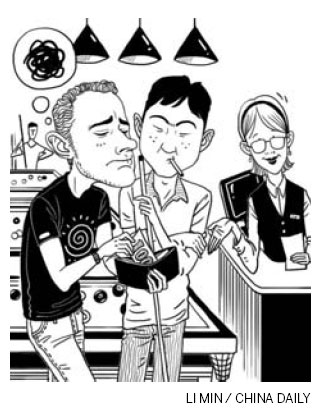Loser pays, the winner takes it all
By David Drakeford ( China Daily ) Updated: 2010-10-14 09:12:48
Pool is a great game. It has skill, tactics and a cooler cachet than its elder brother, snooker.

In England, pool is very much a pub activity. The tables are generally small and badly maintained and most people aren't sober when they play. Chinese pool is a more serious business. At Beijing's plush Ding Junhui Club, a snooker and pool hall named after China's most famous snooker player, would-be Dings hire private rooms for their potting practice and even perform stretching exercises prior to the start of play.
While enjoying a casual knockabout with a couple of friends at the club, several boys carrying their own cues arrived with their parents for after-school practice. Though I was taken aback at first, I can't help but applaud the parents' forward thinking. As snooker's popularity in China soars, there is without doubt superstardom and vast riches awaiting home-grown prodigies.
Though originally an English game, it has become popular in Asia and I can see the head start that China's potential snooker stars have. Most people's introduction into the world of the green baize starts with pool. Pool tables are smaller than those used for snooker and the rules simpler. In China, however, pool tables are considerably larger than in England, making the game tactical, like snooker.
One difference with the English game here is if you scratch, or foul, the other player can pick the cue ball up and place it wherever they like on the table. This "ball-in-hand" rule seems ridiculous at first but is in fact useful for encouraging tactical play. It's easy enough to put the white ball in a good position to pot a color but then what? A better choice is to place the ball so you can pot a color and then be on for another - thinking several steps ahead, as a chess player would.
My first game of pool in Beijing was with my Chinese flatmate. Hong Chun was a terrible sportsman: cheering whenever he potted a ball and laughing each time I missed. Some of my "misses" though, were not what they seemed. I had been making use of the large table to put my opponent in a difficult position and force errors - playing safety shots in other words, like a snooker player does.

Losing a couple of games took the wind out of my friend's sails and his laughter soon dried up. But I have since discovered that not all players here are so cocky.
Near my apartment is a cavernous pool hall. Its doors are open from 9 am to 4 am, with more than 30 tables inside.
I decided to knock some balls about on my own recently. It wasn't long before a local character was hanging around the table, making encouraging noises every time I potted well. After I finished my game, he wanted to play with me, an offer I couldn't very well refuse.
Unfortunately my game fell apart and my challenger had no trouble beating me - though with the good grace of a gentleman.
I decided to head home in defeat and went to settle the bill. To my surprise, my opponent let me pay without a fight -contrary to everything I've learned about picking up a restaurant tab in China. Later, a friend explained to me it is common here for the loser to pay. That makes perfect sense, after all, I had lost all five games.
|
|
|
|
|
|
|
|


























 Raymond Zhou:
Raymond Zhou: Pauline D Loh:
Pauline D Loh: Hot Pot
Hot Pot Eco China
Eco China China Dream
China Dream China Face
China Face






